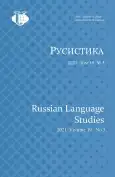Мифонимикон Бунина-поэта: коннотативный аспект
- Авторы: Селеменева О.А.1
-
Учреждения:
- Елецкий государственный университет имени И.А. Бунина
- Выпуск: Том 19, № 3 (2021)
- Страницы: 285-297
- Раздел: Актуальные проблемы исследований русского языка
- URL: https://journal-vniispk.ru/2618-8163/article/view/324606
- DOI: https://doi.org/10.22363/2618-8163-2021-19-3-285-297
- ID: 324606
Цитировать
Аннотация
Исследуется мифонимикон поэтического наследия И.А. Бунина. Актуальность темы обусловлена, с одной стороны, возрастающим интересом литературной ономастики к функционированию собственных имен вымышленных объектов в текстах отечественных и зарубежных авторов (В.Я. Брюсова, Н. Геймана, Д. Джойса, С.А. Есенина, К. Льюиса, А.С. Пушкина, Дж.К. Роулинг, А.А. Фета, М.И. Цветаевой и др.), а с другой - неизученностью вопросов словообразовательной мотивации, семантики, структуры, роли мифологических имен в прозаических и поэтических текстах И.А. Бунина. Цель работы - проанализировать коннотативный потенциал разноструктурных мифонимов, значимых для художественно-эстетической системы Бунина-поэта. Материалом исследования послужили поэтические тексты 1888-1952 гг. Основные методы: описательный, этимологический, контекстологический, семантический и структурный анализы. Инвентаризация более 700 стихотворных контекстов И.А. Бунина позволила выявить 152 мифонима из различных источников: текстов антропогонических, солярных, культовых и других типов мифов народов мира, религиозно-философских учений, произведений фольклора. Выделенные единицы были систематизированы с опорой на четыре классификационных признака: семантика, этимология, структура, частотность употребления. Отмечено, что, выступая ключевыми единицами стихотворных текстов, простые, составные и сложные мифонимы (Алмазная Река, Баба-Яга, Вирь, Митра, Осень, Ра-Озирис, Степная Ночь, Шакал-Анубис и др.) аккумулируют дополнительные коннотативные компоненты. Появление новых комбинаций смыслов, качественное и количественное изменение коннотативного содержания теонимов, мифоперсонимов, мифогидронимов, мифоорнитонимов и прочих групп мифологических имен обеспечивается индивидуально-авторским переосмыслением первоисточников, сложностью мотивационных отношений между производящими единицами и производными, семантическим окружением конкретного мифонима. Мифонимы как единицы ономастического кода стихотворных текстов связаны с ключевыми мотивами, темами, идеями и ценностными оппозициями картины мира Бунина-поэта. К несомненным перспективам можно отнести изучение особенностей мифонимикона бунинской поэзии и прозы посредством инструментария не только лингвистики, но и литературоведения, философии, культурологии.
Об авторах
Ольга Александровна Селеменева
Елецкий государственный университет имени И.А. Бунина
Автор, ответственный за переписку.
Email: ol.selemeneva2011@yandex.ru
доктор филологических наук, профессор кафедры русского языка, методики его преподавания и документоведения
Российская Федерация, 399770, Елец, ул. Коммунаров, д. 28Список литературы
- Aleshchenko, E.I. (2008). The mythonym Baba-Yaga in Russian folk tales. Russian Language at School, (4), 90–93. (In Russ.)
- Alibec, C. (2020). Proper names’ semantics. The Dialogue of Multicultural Discourses (pp. 63–68). Tîrgu Mureş: Arhipelag XXI Press.
- Artz, M. (1988). A Biblical motif in Ivan Bunin’s stories written between 1916 and 1925. In J.J. van Baak, R. Grübel, A.G.F. van Holk, W.G. Weststeijn (Eds.), Studies in Slavic Literature and Poetics. Dutch Contributions to the Tenth International Congress of Slavists (Sofia, September 14–22, 1988) (pp. 1–18). Amsterdam: Rodopi.
- Balanovskii, R.M. (2010). The poetical world-view of the early I.A. Bunin (the poetry of the late 1880th–1890th). RUDN Journal of Studies in Literature and Journalism, (4), 15–22. (In Russ.)
- Berdnikova, O.A. (2012). Reminiscences, quotations and motives of the Psalter in the works of I.A. Bunin. The Problems of Historical Poetics, (10), 315–327. (In Russ.)
- Borodina, N.A. (2019). Folkloristiс character of Baba-Yaga and its art interpretation by I.A. Bunin (as exemplified in his poems “Baba-Yaga” and “Russian fairy-tale”). 80th Anniversary of the Yelets Philology: Proceedings of the International Scientific Conference (pp. 60–63). Yelets: YSU Publ. (In Russ.)
- Bright, W. (2003). What is a name? Reflections on onomastics. Language and Linguistics, (4(4)), 669–681.
- Bushtyan, L.M. (1983). Onomastic connotation: Based on Russian and Soviet poetry (Candidate dissertation, Odessa). (In Russ.)
- Dorokhina, V.G. (2008). Themes, motives, images, plots of the Koran in the lyrics of I.A. Bunin. Izvestia of the Volgograd State Pedagogical University, (2), 164–167. (In Russ.)
- Dudareva, M.A., Smirnova, S.V., Budnichenko, L.A., & Vakku, L.G. (2019). Bunin I.A. and folklore: Ontological in poetics. Amazonia Investiga, 8(22), 129–134.
- Dvinyatina, T.M. (2015). I.A. Bunin’s poetry: Evolution, poetics, textology (Doctoral dissertation, Saint Petersburg). (In Russ.)
- Gary-Prieur, M.-N. (1991). Le nom propre constitue-t-il une catégorie linguistique? Langue Française, 92, 4–25.
- Goiko, Yu.N. (2020). Biblionyms as signs of intertextuality: Features of functioning in a poetic text. Collection of Research Papers of the Yakutsk Theological Seminary, (7), 137–146. (In Russ.)
- Kalinkin, V.M. (1999). The poetics of a proper name. Donetsk: Jugo-Vostok Publ. (In Russ.)
- Lamping, D. (1983). Der Name in der Erzählung. Zur Poetik des Personennamens. Bonn: Bouvier.
- Marullo, T.G. (1998). If you see the Buddha: Studies in the fiction of Ivan Bunin. Evanston: Northwestern University Press.
- McDowell, J. (1977). On the sense and reference of a proper name. Mind. New Series, 86(3), 159–185.
- Pavlyuchenkova, T.A. (2011). Bunin’s artistry as a poet. Russian Language at School, (7), 52–55. (In Russ.)
- Pronchenko, S.M. (2015). Proper names in the poems of I.A. Bunin: A systematic approach (to the 145th anniversary of the writer’s birth). The Bryansk State University Herald, (2), 260–267. (In Russ.)
- Richards, D.I. (1972). Bunin’s conception of the meaning of life. The Slavonic and East European Review, 50(119), 153–172.
- Sayapova, A.M., & Karimiriabi, E. (2014). Iranian mythology in the art world of I.A. Bunin. Uchenye Zapiski Kazanskogo Universiteta. Seriya: Gumanitarnye Nauki, 156(2), 115–120. (In Russ.)
- Shashkova, S.I. (2009). About some atypical features of the individual style of I.A. Bunin. I.A. Bunin and the Russian World: Materials of the All-Russian Scientific Conference (pp. 339–343). Yelets: YSU Publ. (In Russ.)
- Superanskaya, A.V. (1973). General theory of the proper name. Moscow: Nauka Publ. (In Russ.)
- Tolstaya, S.M. (2011). Semantic categories of the language of culture. Essays on Slavic ethnolinguistics. Moscow: LIBROKOM Publ. (In Russ.)
- Usmanova, L.A. (2014). Associative-figurative interpretation of nominatives denoting natural time in Silver Age poetry. Tambov University Review. Series: Humanities, (5(133)), 148–155. (In Russ.)
- Vasiljeva, N. (2005). Literarische Onomastik in Russland: Versuch eines Portraits. Onoma, 40, 373–395.
- Vladimirova, T.E. (2020). Semantic continuum of myth. RUDN Journal of Language Studies, Semiotics and Semantics, 11(2), 161–174. http://dx.doi.org/10.22363/2313-2299-2020-11-2-161-174. (In Russ.)
- Woodward, J.B. (1970). Eros and nirvana in the art of Bunin. The Modern Language Review, 65(3), 576–586.
Дополнительные файлы









